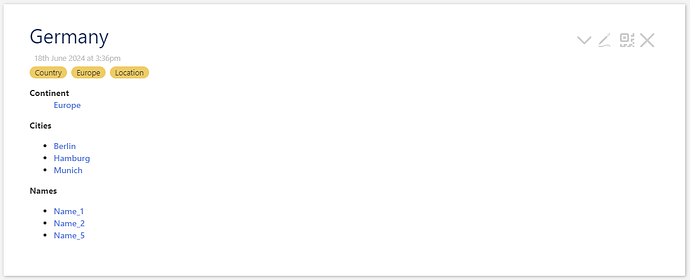Hi Helpers,
I found the function of data tiddlers and index selection and it can help me to implement a function in my wiki I am looking for.
The best way to describe my requirement is an address book.
Germany : Europe
Italy : Europe
France : Europe
China : Asia
Berlin : Germany
Hamburg : Germany
Rome : Italy
Milano : Italy
Paris : France
Nice : France
Name_1 : Berlin
Name_2 : Berlin
Name_3 : Milano
Name_4 : Nice
Name_5 : Hamburg"
The function I am looking for is best described in this 3 requests:
- Request = “Name_1” and the answer is not only “Berlin”, I also want to get as result “Germany” and/or “Europe”
- Request = “Gemany” and the answer is “Europe”, I also want to get the result “Berlin”+“Hamburg” and/or “Name_1”+“Name_2”+“Name_3”
- request = “Europe” and than to have the possibility to get all countries and/or cities and/or names
Is there a chance to develop a filter or similar or any other idea to get it?
I thought about the possibility to use placeholder “***” like this and to use only one data tiddler, but I was not able to solve it also. Maybe I have to change the order? I do not know.
Name_1 : Berlin : Germany : Europe
Name_2 : Berlin : Germany : Europe
Name_3 : Milano : Italy : Europe
Name_4 : Nice : France : Europe
Name_5 : Hamburg : Germany : Europe
*** : Berlin : Germany : Europe
*** : Hamburg : Germany : Europe
*** : Rome : Italy : Europe
*** : Milano : Italy : Europe
*** : Paris : France : Europe
*** : Nice : France : Europe
*** : *** : Germany : Europe
*** : *** : Italy : Europe
*** : *** : France : Europe
*** : *** : China : Asia
Hopefully I described my use case so far that someone here can help me to find a solution. Every solution is welcome.
Thank you in advance
Stefan
